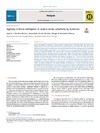Please use this identifier to cite or link to this item:
https://accedacris.ulpgc.es/jspui/handle/10553/70179
| Title: | Applying artificial intelligence to explore sexual cyberbullying behaviour | Authors: | Sánchez Medina, Agustín Jesús Galván Sánchez, Inmaculada Fernández Monroy, Margarita |
UNESCO Clasification: | 120304 Inteligencia artificial 611402 Actitudes 630707 Tecnología y cambio social |
Keywords: | Artificial Intelligence Business Cyberbullying Dark Triad Ensemble Classification Tree, et al |
Issue Date: | 2020 | Journal: | Heliyon | Abstract: | Sexual cyberbullying is becoming a serious problem in today's society. In the workplace, this issue is more complex because of the power imbalance between potential perpetrators and victims. Preventing sexual cyberbullying in organizations is very important for a safety and respectful workplace. Occupational Safety and Health (OSH) standards establish certain policies to be considered to create an organizational culture based on zero tolerance to sexual cyberbullying. The research aims to broaden knowledge about personality and sexual cyberbullying. Therefore, this paper proposes a crucial tool to explore potential sexual cyberbullying behaviour. This study analysed how personality traits, particularly those related to the Dark Triad (psychopathy, Machiavellianism and narcissism), might influence this behaviour. Participants (N = 374) were Spanish young adults, using the convenience sampling to recruit them. The methodology focused on the use of structural equation modelling and ensemble classification tree. First, we tested the proposed hypotheses with structural equation method based on covariance using the Lavaan R-package. Second, for the ensemble of classification trees, we applied the package randomForest and Adabag (bagging and boosting) in R. Results proposed high levels of psychopathy and Machiavellianism are more likely to be related to sexual cyberbullying behaviours. Organizations could use the tool proposed in this research to develop internal policies and procedures for detection and deterrence of potential cyberbullying behaviours. By raising awareness about cyberbullying behaviour including its conceptualisation and measurement in training courses, organizations might build an organizational culture based on a respectful workplace without sexual cyberbullying behaviours. Cyberbullying; Dark triad; Machiavellianism; Narcissism; Psychopathy; Structural equation modelling; Ensemble classification tree, Artificial intelligence; Machine learning; Business; Human resource management | URI: | https://accedacris.ulpgc.es/handle/10553/70179 | ISSN: | 2405-8440 | DOI: | 10.1016/j.heliyon.2020.e03218 | Source: | Heliyon [ISSN 2405-8440], v. 6 (1), e03218 |
| Appears in Collections: | Artículos |
SCOPUSTM
Citations
29
checked on Jun 8, 2025
WEB OF SCIENCETM
Citations
22
checked on Jan 18, 2026
Page view(s) 5
97
checked on Jan 10, 2026
Download(s)
86
checked on Jan 10, 2026
Google ScholarTM
Check
Altmetric
Share
Export metadata
Items in accedaCRIS are protected by copyright, with all rights reserved, unless otherwise indicated.
